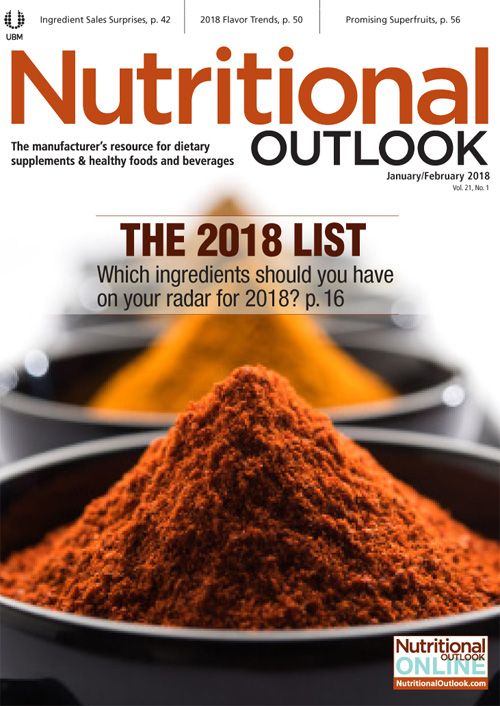2018 Ingredient Trends to Watch for Food, Drinks, and Dietary Supplements: Vitamin K2
Impressive 2017 sales for vitamin K2 indicate that bone health superstar is in for another big year.
Photo © Shutterstock.com/photographyfirm

Ask the average civilian to name the two most important bone health nutrients and they’ll likely mention calcium and vitamin D. And for good reason. But perhaps the question would be better posed to solicit the three most important bone health nutrients-for neither calcium nor vitamin D would be very effective without help from vitamin K2 (menaquinone).
And as far as Eric Anderson, senior vice president of global marketing and business development, NattoPharma USA Inc. (Edison, NJ), is concerned, it’s about time our industry fully reckon with that. “Manufacturers cannot ignore the growing body of evidence that K2 is required for the body to properly metabolize and use calcium,” he maintains. “By adding K2 to products featuring calcium and vitamin D, manufacturers would make more effective bone-support products, while also helping consumers protect their cardiovascular health.”
In fact, not only is vitamin K2 essential to shipping calcium into bones where it keeps them strong; it’s also a key factor for keeping excess calcium out of arteries where its precipitation hastens their hardening and, eventually, cardiovascular disease. All of which is a convincing argument for paying more attention to vitamin K2 in 2018.
Depending on K
In the natural channel, 2017 sales of vitamin K were strong in the bone health category, according to SPINS (SPINSscan Natural, 52 weeks ending November 5, 2017). Fifth behind calcium–magnesium, vitamin D, calcium, and fish oil, vitamin K was the fastest growing of the lot. Vitamin K sales spike 18.7% to $2,667,726. In the multi-outlet channel, vitamin K took the number 8 spot at $907,407 in sales for bone health, a 19.3% increase over last year’s numbers (SPINSscan Conventional, powered by IRI Worldwide, 52 weeks ending November 5, 2017).
It’s a wonder that vitamin K2 doesn’t get even more attention. For while vitamin D and calcium “have already been recognized as strong bones’ ‘best friends,’” says Lorena Carboni, product support specialist, Gnosis S.p.A. (Desio, Italy), the highest incidence of osteoporotic fractures occurs in developed countries, where calcium intake is highest.
Osteoporotic fracture patients also often present with extensive arterial calcium plaques, Carboni continues, and “this simultaneous excess of calcium in one part of the body and lack in another-which may occur in spite of calcium supplementation-is known as the ‘calcium paradox’ and is due to low levels of vitamin K2.”
So, what does vitamin K2 do for bones-and vessels-that neither vitamin D nor calcium can do alone? Vitamin D may enhance calcium absorption, but it will not transport calcium into bone tissue like K2 does. Specifically, K2 activates matrix Gla protein (MGP) and osteocalcin to transport calcium from soft tissues like blood vessels into bone tissue (thereby also reducing arterial calcification), while vitamin D simply promotes osteocalcin production by bone cells.
Just Can’t Get Enough
Alas, our modern Western diets don’t give us the vitamin K2 we need-particularly not in the menaquinone-7 (MK-7) form that Carboni says optimizes carboxylation. Colonic bacteria can produce MK-7, among other menaquinones, but its bioavailability is poor. And unlike with other fat-soluble nutrients, the body doesn’t store vitamin K2. The upshot: “Its deficiency, often subclinical in a large part of the population, is present in most healthy adults and children in the West,” Carboni says.
This, again, suggests a need for more widespread supplementation, particularly as vitamin D intake rises-after all, the more we supplement with vitamin D, the more we need vitamin K2 to carboxylate all those K-dependent proteins that vitamin D makes. Thus, Carboni echoes Anderson in calling for calcium supplements to be formulated with vitamins D and K2 “for real benefits to bone and heart health.”
Shifting the Focus
Sufficient evidentiary firepower to shift focus onto vitamin K2 may emerge in the wake of a pair of grants that NattoPharma’s International Research Network, coordinated by the Cardiovascular Research Institute at Maastricht University (CARIM), received in 2017, as well as from two clinical trials published the same year.
The studies investigate MK-7 supplementation’s role in improving vascular calcification, with the first,1 published in June 2017, focusing on hemodialysis patients-a population recognized by the European medical community as vitamin K deficient. Researchers gave 50 such patients 360 μg of menaquinone-7 (MenaQ7) daily for four weeks and measured vascular calcification scores and levels of dp-ucMGP (dephosphorylated-uncarboxylated matrix Gla protein, or “inactive” MGP) as proxies for vitamin K2 status. Not only did they find that hemodialysis patients have “profound vitamin K deficiency as assessed by high dp-ucMGP plasma levels, which are significantly correlated with high aortic calcification scores and thus can be used as a noninvasive marker for vascular calcifications,” Anderson says, but that daily supplementation with 360 μg of MK-7 decreased dp-ucMGP by 86% after four weeks.
The second study2 involved renal transplant patients-also known to be subclinically vitamin K deficient. After eight weeks of taking 360 μg of MK-7 daily, their arterial stiffness and 24-hour peripheral and central pressures significantly improved. Supplementation also improved vitamin K2 status, as manifested in lower dp-ucMGP concentrations. “We have more studies underway currently,” Anderson adds. “Further, the medical community is also now sponsoring studies looking at K2 as a therapy in diseased populations as an alternative to drugs.”
Beyond Bones and Blood Vessels
Notes Carboni, “We know by now that some of the major benefits of consuming vitamin K2 include the improvement of bones and cardiovascular health, but what’s emerging is its role in an increasing number of age-associated diseases.”
Researchers have lately described and classified other K-dependent proteins in different organs and tissues, including growth arrest specific gene 6 (Gas-6), transmembrane Gla proteins (TMG3 and TMG4), proline-rich Gla proteins (PRGP1 and PRGP2), Gla-rich protein (GRP), periostin, and transhyretin. “In 2018, alongside a consolidation of the studies related to bone and cardiovascular health, we’ll see new studies on vitamin K2’s emerging role in inflammation, chronic kidney disease (CKD), immunity, and cancer,” Carboni says.
And Anderson couldn’t be happier. “Vitamin K2 is the poster child for what’s right about nutrition: this is something found in food and correlated to bone and cardiovascular health; the nutrition industry has identified and standardized it; we’ve validated the efficacy in multiple human studies involving healthy subjects; and this has attracted attention from the medical community, who are now investigating it in drug studies,” he says. “This is a huge win for the natural products industry.”
2018 Ingredient Trends to Watch for Food, Drinks, and Dietary Supplements:
References:
1. Aoun M et al., “High dephosphorylated-uncarboxylated MGP in hemodialysis patients: risk factors and response to vitamin K2, a pre-post intervention clinical trial,” BMC Nephrology, vol. 18, no. 1 (June 2017): 191
2. Mansour AG et al., “Vitamin K2 supplementation and arterial stiffness among renal transplant recipients-a single-arm, single-center clinical trial,” Journal of the American Society of Hypertension, vol.11, no. 9 (September 2017): 589-597

Prinova acquires Aplinova to further increase its footprint in Latin America
April 7th 2025Prinova has recently announced the acquisition of Brazilian ingredients distributor Aplinova, which is a provider of specialty ingredients for a range of market segments that include food, beverage, supplements, and personal care.

























